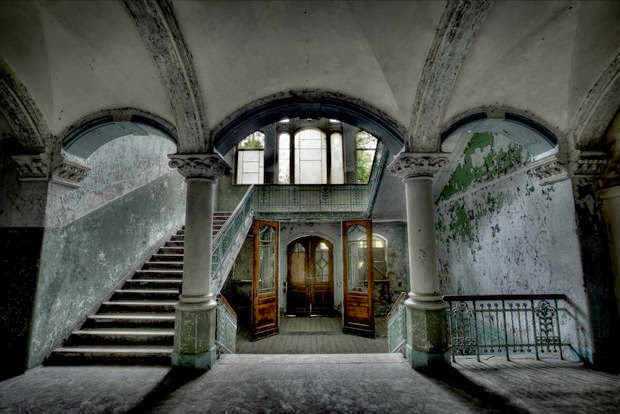The post-apocalyptic landscape photographs collected in Rebecca Litchfield’s book Soviet Ghosts constitute a hauntingly beautiful ode to death and decay and aroused in me a voyeuristic fascination. Here, desolated and disintegrating buildings, their interiors wreathed in pealing plaster, function as “galleries of cultural memory, exhibiting the social detritus of a recent civilization”.
These ruins resonate with a melancholic nostalgia, with poetic sentiment that harks for a turn of phrase; In the gathering dust a child’s doll rests, here a hat perches on the edge of a chair, and broken windows gaze somnolently out on wild urban prairies, on burgeoning forests that crowd in against civilization's intrusion. Everywhere the sublime in nature, and everywhere the entropic passage of time casts its pall in wonderfully textured patterns of corrosion and colour.
The text elucidates expertly on the underlying aesthetic theory "Many of the photographs are what in German would be described as unheimlich, a term derived from Freud’s musing upon aesthetics and translated loosely as ‘uncanny’. It describes a feeling of unease in a familiar setting, or might also suggest a hidden secret that is not known. Far from being just documentary in form, the unheimlich in the aesthetic of decay breathes life into the inanimate, an existence not measured in its lifetime but recognised through its decomposition in death. For it is here and now that it finds its true significance, where the mundane becomes an object of beauty."
For me, the photographs evoke a contemplative intimation of the void, what Daniel Pinchbeck described as, "that vast garbage heap of all that is unknown and forgotten — that empty maw into which all celebrated enterprises eventually follow". Everywhere the fragility and fleetingness of human existence is made visible, while offering an unsettling presentiment about the ideological master narratives that animate our own lives, the closeness is almost suffocating, post-society, post-human, post-life. In this context Susan Sontag’s famous commentary on photography offers a grave literality "To take a photograph is to participate in another person (or things) mortality, mutability, vulnerability. Precisely by slicing out this moment and freezing it, all photographs testify to times relentless melt".
Title: Soviet Ghosts
Author: Rebecca Litchfield; written by Tristi Brownett, Neill Cockwill, Owen Evans.
Publisher: Great Britain, Carpet Bombing Culture 2014
ISBN 9781908211163




